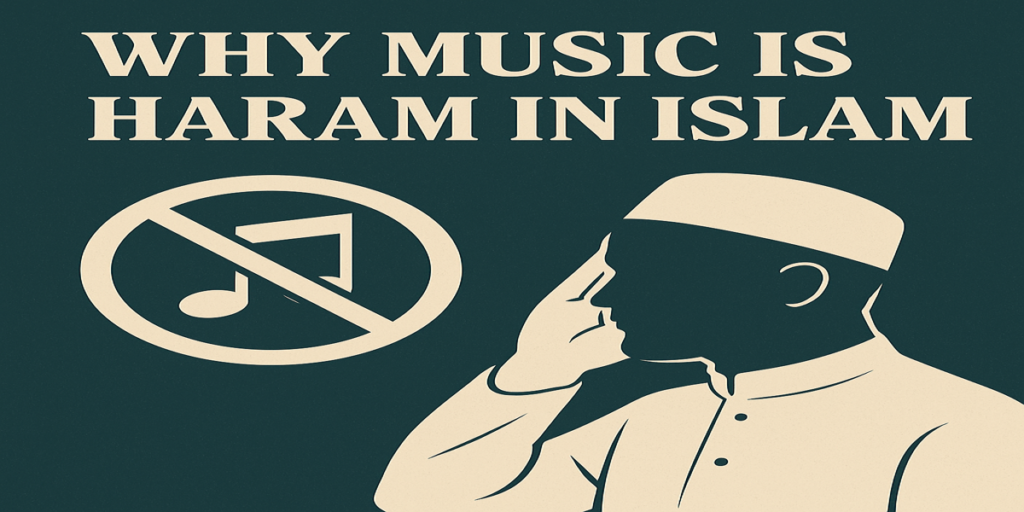📌 Introduction: The Debate Around Music in Islam

Is music haram in Islam? This question has sparked debate among Muslims for centuries. While some scholars strictly prohibit music, others allow it under certain conditions. In this article, we explore the evidence, interpretations, and views from Islamic sources to help you understand why music is considered haram by many scholars.
📖 What Does the Quran Say About Music?
The Quran does not explicitly mention music as haram. However, scholars often reference this verse:
“And of mankind is he who purchases idle talks to mislead from the path of Allah…”
(Surah Luqman 31:6)
Some classical scholars interpret “idle talks” (lahw al-hadith) to include music and singing that distracts from faith and remembrance of Allah
📜 Hadiths About Music Being Haram
Several hadiths from authentic sources are commonly cited as evidence that music is haram:
“There will be among my followers people who will consider as permissible illegal sexual intercourse, the wearing of silk, the drinking of alcoholic drinks, and the use of musical instruments.”
(Sahih al-Bukhari 5590)
This hadith is often interpreted to mean that musical instruments are forbidden and will be normalized by future generations.
⚖️ Why Do Scholars Say Music Is Haram?
1. It Distracts From Worship
Music can lead people away from prayer and remembrance of Allah, replacing spiritual focus with entertainment.
2. It Promotes Immorality
Modern music often includes vulgar lyrics, promotes alcohol or lust, and encourages sinful behavior.
3. Hadith Evidence
Several sahih hadiths (authentic narrations) mention musical instruments negatively, linking them with other prohibited acts.
4. Consensus Among Early Scholars
Many early scholars, especially from the Hanbali and Shafi’i schools, regarded music as haram based on its spiritual and moral impact.
🧠 Other Views: Is All Music Haram?
Not all scholars agree. Some scholars from the Hanafi and Maliki schools believe music is permissible with conditions:
Lyrics must not be vulgar or promote sin.
It should not lead to neglect of religious duties.
It can be used for spiritual upliftment (as seen in Sufi traditions).
🥁 What About Islamic Music or Nasheeds?
Nasheeds, or vocal-only songs about faith and morality, are widely accepted across the Muslim world. Some allow the duff (a drum-like instrument), especially during Eid or weddings, as permitted in several hadiths.
“Let them sing, for this is a day of Eid.” – Prophet Muhammad ﷺ (Sahih Bukhari)
📝 Conclusion: Why Many Say Music Is Haram in Islam
While the Quran does not ban music directly, the hadith evidence, the position of many scholars, and the potential harms of modern music have led many to view it as haram. Others allow it with strict conditions.
Ultimately, the answer depends on:
Your madhhab (school of thought)
Your intention
The effect of music on your soul and behavior
📚 Sources & References:
Sahih al-Bukhari, Hadith 5590
Tafsir Ibn Kathir, Surah Luqman 31:6
Imam al-Ghazali – Ihya Ulum al-Din
Shaykh Yusuf al-Qaradawi – The Lawful and the Prohibited in Islam
Fatwas from scholars on IslamQA, Dar al-Ifta, and SeekersGuidance
Related Articles:
1. Why US Invaded Iraq
2. Why Russia Invaded Ukraine
3. Top 10 Universities in the World
4. Top 10 Economies in the World
5. Top 10 Military in the World
6. Top 10 Websites in the World
7. Top 10 Investments to Make Money
8. Top 10 Holiday Destinations
9. Top 10 Companies in the World
10. Top 10 Richest People in the World
11. Top 10 Richest Man in Bangladesh

